The Canada Agreement and the Democratic Legitimacy - a New European Riddle
Adelina Marini, November 2, 2016
Just as it seemed that the October European Council will be the first boring one for quite awhile, because there is no large crisis, which requires an urgent solution, and here comes the trade agreement with Canada, which turns into just such a crisis which (once more) the EU’s ability depends on to be something more than a bunch of ever more distanced states. The crisis ended with a happy end a little over a week after the two-day EU summit, but brought to the surface a very important question, which the leaders of member states did not raise even at the themed summit in Bratislava in September – is this the democratic legitimacy that we need – referenda, regional vetoes, national vetoes?
Just like the comprehensive trade agreement with Ukraine, which in the end brought the ignition of an armed conflict between Ukraine and Russia and marked the return of ideological division from the 20th century between the East and the West on Russia’s initiative, the comprehensive agreement with Canada turned out to be much more than a trade agreement. As the president of the European Council said on Sunday, October 30, when the agreement was officially signed, it “demonstrates that the disintegration of the Western community does not need to become a lasting trend. That we still possess enough strength and determination - at least some of us - to counter the fatalism of the decay of our political world”. What is more, according to Donald Tusk (Poland, EPP), “that post-factual reality and post-truth politics pose a great challenge on both sides of the Atlantic”.
Canadian Prime Minister Justin Trudeau went even further, calling the agreement “historic” and a “trade entente”. Despite its strong geopolitical importance, however, it was threatened by failure. During the October EU summit, odds for signing the agreement were 50:50. There were two blocks hanging on it. One was the refusal of the regional parliament of Wallonia to back it, and the other turned out to be the first possibility for Bulgaria to impose a veto in the Council, in order to exert pressure for the achievement of a strategic goal – the fall of visas to Canada for Bulgarian nationals. If a solution was found to the Wallonian problem, the Bulgarian prime minister was adamant that he will impose a veto. The Bulgarian determination, however, almost got lost in between the day-and-night marathon negotiations between the European Commission, the European Council president, and the Wallonia prime minister.
Prior to the start of the October 20-21 summit in Brussels, the focus was entirely on the Comprehensive Economic and Trade Agreement (CETA). “But truly speaking, the problem goes beyond CETA. If you're not able to convince people that trade agreements are in their interest, if we're not able to convince them that our representatives negotiate the free trade agreements to protect people's interest we will have no chance to build public support for free trade. And I'm afraid this means that CETA could be our last free trade agreement”, dramatically announced President Tusk.
2 million vs 500 million or the EU is a democracy of unanimity
The problem with CETA appeared at the June summit when member states insisted that it be treated as a mixed agreement, meaning a document which includes both national and European competences. Despite the fact that leaders at the time were fully immersed into the results of the British referendum and the discussions on the future of the European Union, in fact, under the surface smoldered the fire of the Canadian agreement, after it became clear that there was a conflict between European Commission President Jean-Claude Juncker (Luxembourg, EPP) and several member states, because Mr Juncker insisted that the agreement remained under European competence, meaning that it is to be adopted and ratified by the Council and the European Parliament. German Chancellor Angela Merkel insisted, however, that national parliaments be also included in the approval of the document.
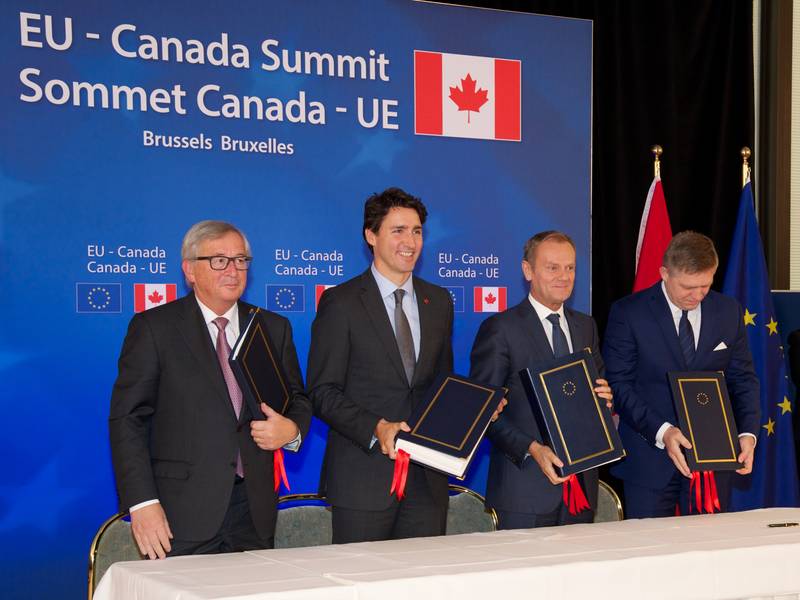 “With CETA, the EC has explained that they don’t see the necessity for a mixed agreement where I explained for the federal government we wish for such an agreement. A mixed agreement that is to say for national parliaments, too, will have to have a say”, she said during Germany’s national briefing after the summit on June 28. According to some, this had opened Pandora’s box right at the time when Great Britain opened the EU’s door with arguments against the excessive concentration of power in the hands of Brussels institutions. President Juncker defended himself by saying that he never insisted on the agreement not being a mixed one. “I don’t really care myself personally”, he said at a press conference on June 28 in Brussels. “But to say that I had a personal preference that national parliaments shouldn’t have a say, well, that’s absurd”, added the famous for his federalist views veteran at the European political scene.
“With CETA, the EC has explained that they don’t see the necessity for a mixed agreement where I explained for the federal government we wish for such an agreement. A mixed agreement that is to say for national parliaments, too, will have to have a say”, she said during Germany’s national briefing after the summit on June 28. According to some, this had opened Pandora’s box right at the time when Great Britain opened the EU’s door with arguments against the excessive concentration of power in the hands of Brussels institutions. President Juncker defended himself by saying that he never insisted on the agreement not being a mixed one. “I don’t really care myself personally”, he said at a press conference on June 28 in Brussels. “But to say that I had a personal preference that national parliaments shouldn’t have a say, well, that’s absurd”, added the famous for his federalist views veteran at the European political scene.
On July 5, the EC announced the agreement to be a mixed one. “From a strict legal standpoint, the Commission considers this agreement to fall under exclusive EU competence. However, the political situation in the Council is clear, and we understand the need for proposing it as a 'mixed' agreement, in order to allow for a speedy signature”, said following the announcement of the decision Commissioner for Trade Cecilia Malmström (Sweden, ALDE). With this decision, practically the European Commission returned a solid chunk of sovereignty to member states. Instead of achieving a speedy signature, however, the agreement was stopped in its tracks by the regional parliament of Wallonia (a region in Belgium), which stood two million people from the region against all the rest in the EU, who had no objections to CETA or, at least, did not manifest them in the form of a veto.
How democratic is that?
Usually decisions in the EU are made by unanimity. This is the highest form of democracy in existence and is in a drastic contrast to the national level of democracy, where decisions in national parliaments are made with regular majority, often very thin, and elections are often won at a very low level of participation. And the case of the Dutch referendum is truly shocking. At this vote earlier this year, the Dutch discarded the ratification of the comprehensive trade agreement with Ukraine (which also has a very strong geopolitical importance), already ratified by all other EU member states, at voter turnout of 32.28%. In the Council of Ministers at the European level, however, there are written and unwritten rules for making decisions. Unanimity is preferred, because it gives the opportunity to every member state to preserve its “sovereignty” over the decision being made.
The freshest deviation from this unwritten norm was with the proposal for a quota redistribution of refugees, which was ultimately approved by a qualified majority, due to resistance by Hungary and a few other member states. A case, which began digging a new hole under the foundations of the EU and its unity. In the peak of the euro area crisis, there was a lot of talk on the lack of democratic legitimacy in the making of decisions which are important to the Union. The term got ingrained so deeply into Brussels lingo, that it was part of every speech, statement, or debate both in Brussels or Strasbourg and the capitals of the 28. The search for democratic legitimacy was almost like a gold rush in the midst of growing Euroscepticism, which forced euinside to dedicate several texts to the subject, like this one for example.
Democratic legitimacy turned into a part of the EU strategic goals, written in the programme of the Union until the year 2020, as we reported two years ago. The programme envisioned that a greater role is given to national parliaments, “including by strengthening their means of participating in the debate and making their voice heard in the decision-making process”. Well, their voice was heard. Not only the national voice, but also the regional one, for Belgium is a country of almost as complicated a state structure as post-war Bosnia and Herzegovina. And while the leaders of member states and negotiators on CETA pondered on the way to walk out of the trap they set themselves, euinside asked the president of the European Parliament (the only institution with direct election by European citizens) Martin Schulz (Socialists 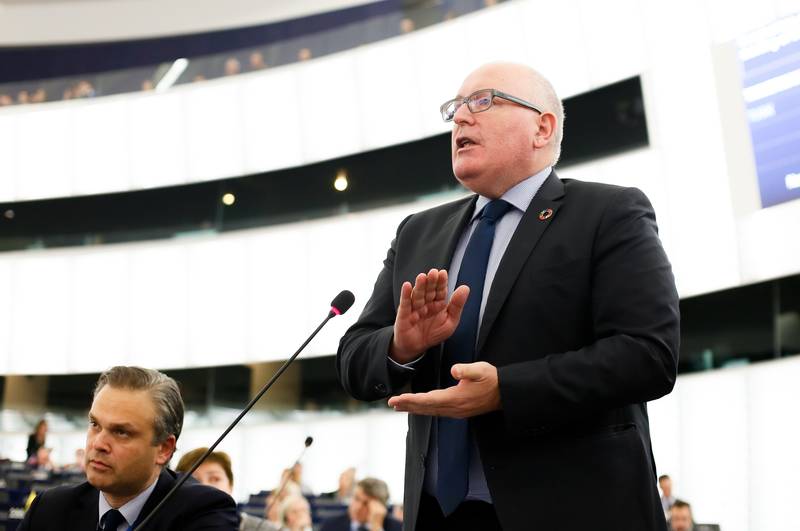 and Democrats, Germany) the question whether the Wallonia veto represents the democratic legitimacy that all talked about and dozens of pages of documents were written about.
and Democrats, Germany) the question whether the Wallonia veto represents the democratic legitimacy that all talked about and dozens of pages of documents were written about.
After a long pause (you can see a recording of Mr Schulz’s reply in the attached file), the EP boss began thinking out loud. With mixed agreements, he said, the part, which affects Europe, is decided on in the EP, and questions of national competence are handled by national parliaments within the boundaries of their constitutions. “The question is what is the definition of mixed agreements and how far reaching are the European only parts and the national parts”, he said and pointed at the Ukraine agreement, in which the national portion is tiny but despite that it led to a huge problem for the entire EU (which, by the way, still stands unresolved). “Therefore, we must for sure discuss about the very precise definition who is responsible for what and in that frame we have to decide who is giving the legitimacy. This is a difficult problem and shows that the EU needs debates about that, also after Brexit”, added the president.
If it wasn’t for Wallonia, it would have been Boyko Borissov
Even if the Wallonians had not pointed their raised middle ... democratic legitimacy to all the rest, CETA would still be blocked, perhaps. Prior to the start of the summit Prime Minister Boyko Borissov was initially quite adamant, but started to lose his grip with the advance of questions. The subject was the only one that he was willing to discuss in all the occasions when he met with Bulgarian journalists in Brussels during the two-day October European Council. Regardless of receiving other questions as well, first of all he wanted to speak his mind on the CETA.
"Why do we and Romania have the so called reserve? And I expect us today [October 20] to reach an agreement, for everyone in Europe wishes that such an agreement, but Bulgaria and Romania have the following reserve. It is linked to the visas and it is not due to us wishing to nag, but because a trade agreement has value for any country, so that both sides can trade. And if we have visas or our businessmen need to stand in line for hours, for years, waiting, as it is now, then how do we explain it to the people that we should accept this agreement?”, he began, stressing that Sofia insists on written guarantees. When asked (by euinside) should a solution be found for the Wallonia problem, will Bulgaria continue to block the agreement, Mr Borissov replied with another question: “Do you find my position eligible for blame on whatever grounds?".
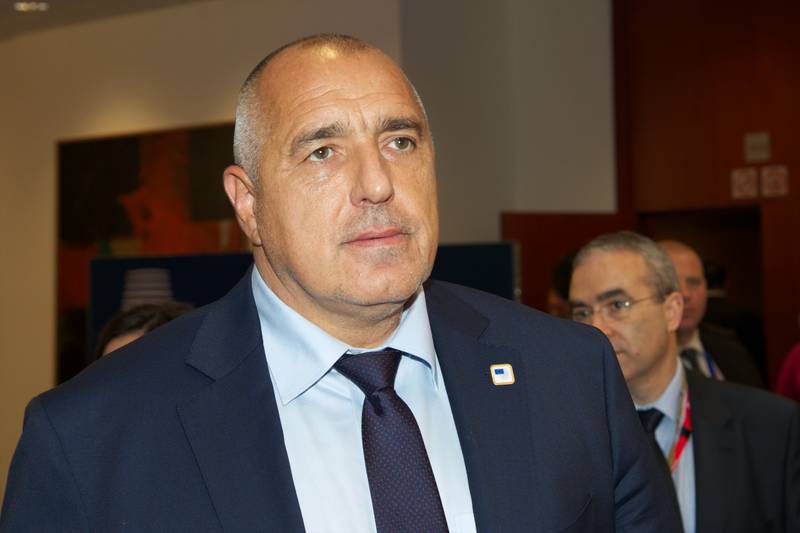
However, it is not euinside sitting at the negotiations table, so I insisted that the PM answers the question. His reply was quite worrying. “I am replying clearly. Signing an agreement, in which there are no guarantees that Bulgarian businessmen, or tourists, or whatever, will go freely to Canada, as theirs do here. I am ready to make a commitment that if they start to settle, which worries them most – Roma people, or migrants, those we do not want coming in Bulgaria and the like - then we will make some agreement in the future, regulate it, like with the rest of the European states, but we need to have a written document which guarantees us that by December of 2017 this will happen”, were the words of the prime minister.
At the subsequent new question by euinside of whether if Bulgaria stands on its own (without Romania) in its veto, he will continue to insist on guarantees, Borissov caved in: “I want to state once more – I am making tremendous efforts, because I believe my position to be completely fair and correct, and if this concerned France or Germany will they have accepted it? And thus I will attempt to fight it through.” He managed to receive his guarantees and after the happy ending of this drama the visa regime will be dropped for Bulgarian and Romanian nationals, starting December 1 of next year. For the Bulgarian PM, however, for whom it would be the first attempt to stand in opposition to the rest of his colleagues, it is a dangerous precedent. (The full speech of the prime minister from the first day of the summit is available to view in Bulgarian here)
This is democracyyyyyyyyy
“Because this is what happened for Schengen – one country stopped Bulgaria and Romania, others stop whatever, this becomes a fad and is very dangerous to the EU. With all due respect to any authority, with all the constitutional perks in any state, but it sounds kind of wrong. You witnessed it – in The Netherlands they stopped Ukraine for the visa-free regime, we all did everything for the Ukraine, got in an argument with Russia, introduced sanctions. All of a sudden, when they need their European way opened for them, they have no visas”, said the PM after the end of the summit.
Lithuania President Dalia Grybauskaitė was opposed to throwing all the blame on EU regions. “I think the process, both sides, are a little bit guilty of what's happening. We're partly hostages of internal politics of one country and another thing is the process - how open and transparent the process of negotiations was”, she added. Following the signing of CETA, which yet needs to be ratified by the parliaments of member states and Canada, Prime Minister Justin Trudeau ascribed it all to democracy. “I believe in democracy. Our democratic institutions and principles demand when a leader or government puts over a proposal they'd be questioned by opposition who disagree and think they need to challenge whether it's been done the right way, whether it's in the interest of everyone, whether we'd thought about the impact on the most vulnerable, whether various regions or constituencies will be affected positively or negatively by any given proposition. That's at the centre of a healthy functioning democracy”, he said.
The subject divided members of the European Parliament last week during the debate on the outcome of the October European Council. Liberal MEP Sophia in 't Veld stated that the CETA episode had uncovered a far bigger problem and it is the weakness of the Council. “The EU cannot continue like this. If we look at the list of topics on the table, we have: sanctions against Russia – blocked; the Ukraine Agreement – jeopardised; CETA – blocked; refugee relocation – blown out of the water; the decision on Article 50 with the EU – kept dangling for nine months, and now one of the countries is threatening to veto the budget. We cannot continue like this”, exclaimed the MEP.
Her colleague from the group of the Greens Ska Keller (Germany) hailed the Wallonians’ blockade, stating that their worries are shared by millions of citizens, who protested and signed petitions. “The problem is that those concerns were not addressed, or not sufficiently addressed, and together we need to learn the lessons from that”, she said, but got a reply from Sophia in 't Veld: “You are all welcoming the veto by the Wallonian Parliament and, in doing so, you actually disregard democratic decisions that have been taken in other countries. What kind of a democrat are you if you say that the Wallonian Parliament – which is indeed democratically elected, as Mrs Le Pen said – but so are the other parliaments? All the 28 Member States have democratic institutional arrangements that you seem to completely deny”.
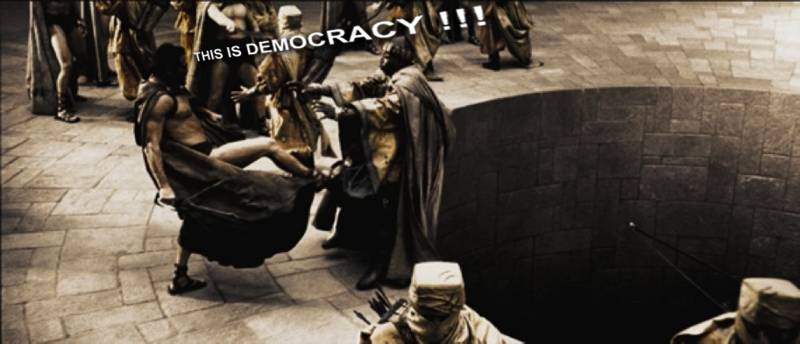 “I think a big problem is that indeed many parliaments, including us, are only asked when the whole deal is done. They should have been asked before, and then they could raise it”, replied Ska Keller. The Belgian MEP, also from the Greens group, Philippe Lamberts, in turn stated that obviously the Wallonians did read CETA thoroughly, unlike all others. Opposed to this claim was Pavel Telička (ALDE, Czech Republic), who believes there was a mandate for negotiations but neither Wallonia, nor Belgium raised these concerns when the mandate was being approved. Esteban González Pons (EPP, Spain) was adamant that at the moment the Brexit is turning into a model “There’s no point in a region with just two million inhabitants being allowed to block the interests of a continent of 500 million inhabitants. Democracy is a two-way street. The majority should always prevail over the interests of a minority“, he said and underlined that globalisation is a fact, not an ideology.
“I think a big problem is that indeed many parliaments, including us, are only asked when the whole deal is done. They should have been asked before, and then they could raise it”, replied Ska Keller. The Belgian MEP, also from the Greens group, Philippe Lamberts, in turn stated that obviously the Wallonians did read CETA thoroughly, unlike all others. Opposed to this claim was Pavel Telička (ALDE, Czech Republic), who believes there was a mandate for negotiations but neither Wallonia, nor Belgium raised these concerns when the mandate was being approved. Esteban González Pons (EPP, Spain) was adamant that at the moment the Brexit is turning into a model “There’s no point in a region with just two million inhabitants being allowed to block the interests of a continent of 500 million inhabitants. Democracy is a two-way street. The majority should always prevail over the interests of a minority“, he said and underlined that globalisation is a fact, not an ideology.
Another EPP MEP Paulo Rangel (Portugal) reminded that no one was worried by the agreement with Vietnam, where there are true problems, like women and child labour for example. Why is it exactly with Canada that worries arose, he asked. The debate in Strasbourg also revealed the division between the European Commission First Vice-President Frans Timmermans (The Netherlands, Socialists and Democrats) and European Council President Donald Tusk. At the end of the debate Mr Timmermans sent out sharp criticism against anti-globalists: “If you believe, at the beginning of what I call the 4th industrial revolution, you can protect yourself from not going into agreements with parts of the world where they share our values you are delusional”, he said.
Donald Tusk, however, differed in his opinion: “The debate in Belgium and Wallonia's resistance do not result from the belief that the competences of EU institutions regarding trade policy are too limited. Today, people would prefer the states and national parliaments to have a bigger influence on the course of things, not smaller. If it is even easier to govern Europe, thanks to this. Of course it is not. But no-one will change the fact that EU is still the Union of States and not institutions”, he said.
Sovereignty given, sovereignty accepted!
Translated by Stanimir Stoev
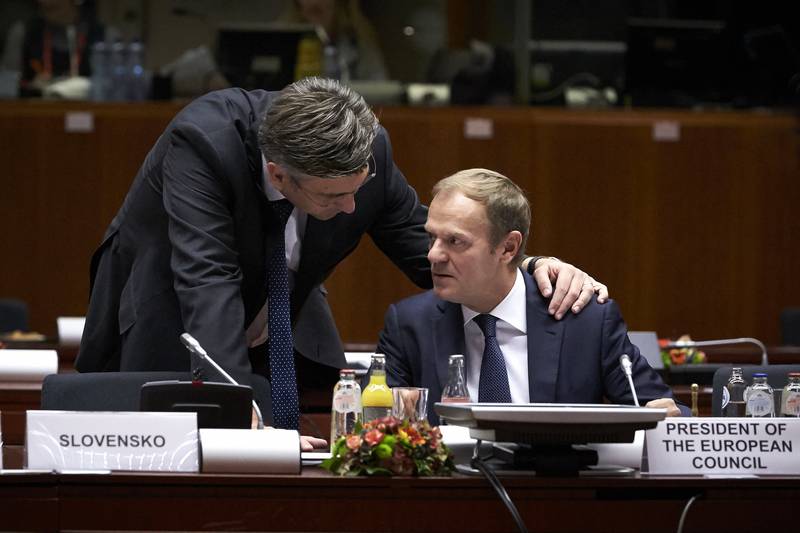 Andrej Plenkovic, Donald Tusk | © Council of the EU
Andrej Plenkovic, Donald Tusk | © Council of the EU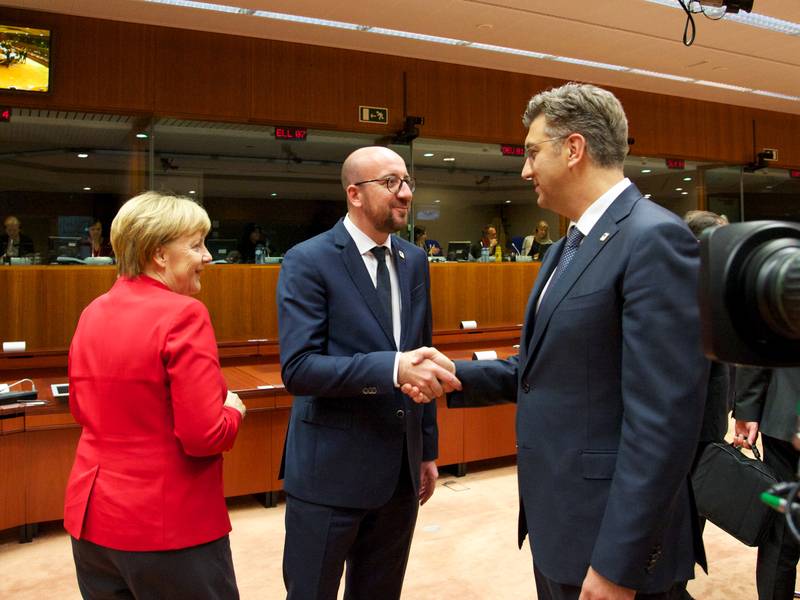 Merkel, Michel, Plenkovic | © Council of the EU
Merkel, Michel, Plenkovic | © Council of the EU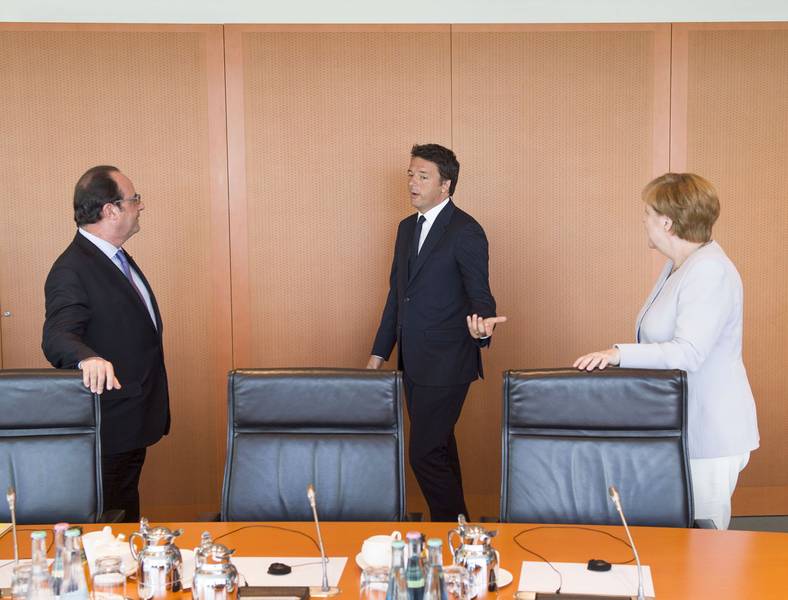 Hollande, Renzi, Merkel | © Council of the EU
Hollande, Renzi, Merkel | © Council of the EU